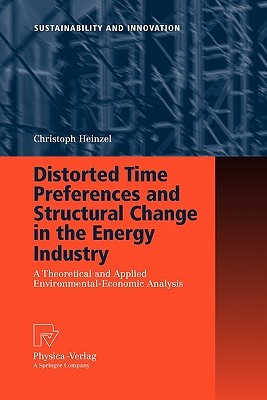
- We will send in 10–14 business days.
- Author: Christoph Heinzel
- Publisher: Physica Verlag
- Year: 2010
- Pages: 166
- ISBN-10: 3790825840
- ISBN-13: 9783790825848
- Format: 15.6 x 23.4 x 1 cm, minkšti viršeliai
- Language: English
- SAVE -10% with code: EXTRA
Distorted Time Preferences and Structural Change in the Energy Industry (e-book) (used book) | bookbook.eu
Reviews
Description
The present study is a slightly revised version of my PhD thesis which was accepted at the Economics Department of Dresden University of Technology in July 2008. It has a long and a short history. For it began, as suggested theme, as a fundamental evaluation of evolutionary economics for ecological economics, asking, especially, for what the two ?elds actually constitutes and, eventually, relates. In several years of unfruitful dwelling, however, neither of these two young, non-mainstream ?elds proved as constituted at a fundamental level as yet. Rather, ecological economics, founded at the end of the 1980s as an attempt to combine social and natural s- ence approaches(in particular economics and ecology) to study especially long-run environmental problems in an encompassing manner, has mainly developed into an interdisciplinary research forum on environmental-economicissues. Particularly uni?edbycertainnormativestances sharedwithinits community, it constitutes, well understood, a new discpline of its own right, distinct from economics, with its own scienti?c standards, questions, methodologies and institutions (Baumgartner ] and Becker 2005). Modern evolutionaryeconomicson the other hand has been a quarter of a century after its inception with Nelson and Winter (1982) still a mainly h- erogeneousendeavor, linked by a (rather amorphous) common interest in economic "evolution" and a critical stance towards neoclassical mainstream economics, with a certain strength in applied studies on industrial dynamics (Heinzel 2004, 2006).
EXTRA 10 % discount with code: EXTRA
The promotion ends in 23d.05:05:55
The discount code is valid when purchasing from 10 €. Discounts do not stack.
- Author: Christoph Heinzel
- Publisher: Physica Verlag
- Year: 2010
- Pages: 166
- ISBN-10: 3790825840
- ISBN-13: 9783790825848
- Format: 15.6 x 23.4 x 1 cm, minkšti viršeliai
- Language: English English
The present study is a slightly revised version of my PhD thesis which was accepted at the Economics Department of Dresden University of Technology in July 2008. It has a long and a short history. For it began, as suggested theme, as a fundamental evaluation of evolutionary economics for ecological economics, asking, especially, for what the two ?elds actually constitutes and, eventually, relates. In several years of unfruitful dwelling, however, neither of these two young, non-mainstream ?elds proved as constituted at a fundamental level as yet. Rather, ecological economics, founded at the end of the 1980s as an attempt to combine social and natural s- ence approaches(in particular economics and ecology) to study especially long-run environmental problems in an encompassing manner, has mainly developed into an interdisciplinary research forum on environmental-economicissues. Particularly uni?edbycertainnormativestances sharedwithinits community, it constitutes, well understood, a new discpline of its own right, distinct from economics, with its own scienti?c standards, questions, methodologies and institutions (Baumgartner ] and Becker 2005). Modern evolutionaryeconomicson the other hand has been a quarter of a century after its inception with Nelson and Winter (1982) still a mainly h- erogeneousendeavor, linked by a (rather amorphous) common interest in economic "evolution" and a critical stance towards neoclassical mainstream economics, with a certain strength in applied studies on industrial dynamics (Heinzel 2004, 2006).


Reviews